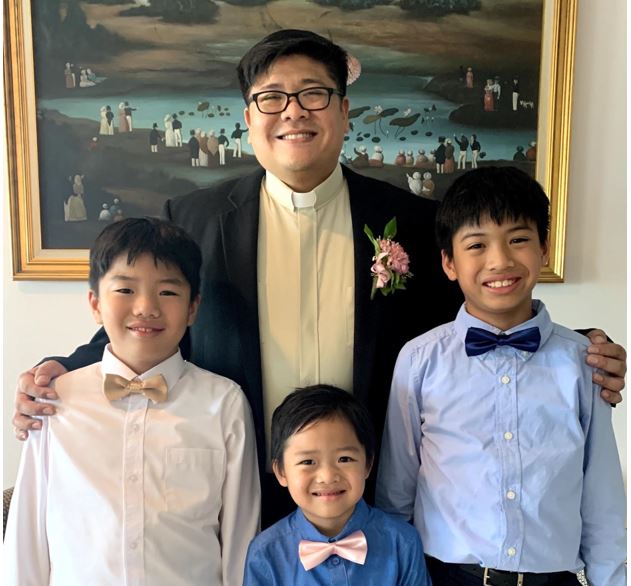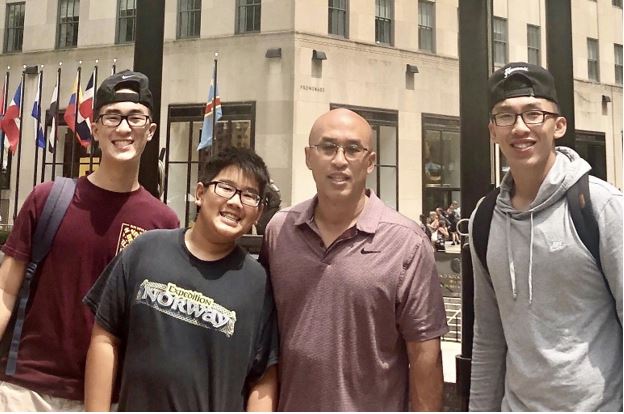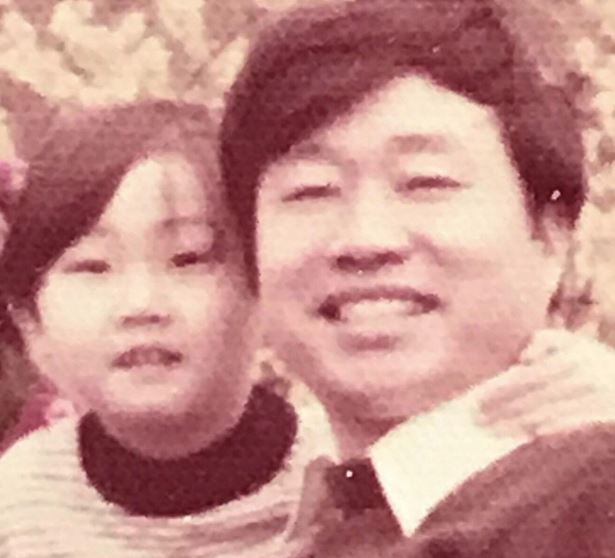By Barbara Yau, AsAm News natural powers
During this time of civil unrest in our country, parents are finding it necessary to have meaningful conversations with their children about race and racism. Parents are confronted with the challenge of raising social conscious children in a divided world, where Black Lives Matter has become the focus of our narrative across the country and the world. Asian Americans parents are tasked with the additional need to address the anti-Asian sentiment and racism that have surged in the wake of the coronavirus epidemic.
As they reflect on the issues of race and racism, some Asian American parents are realizing that they are addressing these issues with their children very differently from how their own parents handled it decades ago. There appears to be a vast difference in perspectives and discussions related to race and racism across generations of Asian American families.
Today, we highlight the personal stories of five Asian American fathers who share their thoughts on the differences between how their parents addressed issues of race and racism during their childhood and how they are now approaching this sensitive topic with their own sons, who will become the fathers of the next generation. These stories illustrate how Asian American dads are playing a crucial role in educating and guiding their children to become good and informed citizens in today’s complex world.

Myles Alejandrino: “My parents are from the Philippines. And like many Asians who first come over to the United States, they came with certain biases about other people of color. My parents also addressed racism with defensive sentiments because we were victims of racism by other minorities in our community. I am more open than my parents because I didn’t grow up in a homogeneous society like my parents did in the Philippines. And since I grew up in a diverse neighborhood in California, I made friends of all races.
I have twin boys who are six years old, and we have had brief conversations about what has been going on. At their age, we have not gone into in-depth explanations, but we respond to their questions as simply and clearly as we can. We try to explain the reasoning behind people’s actions. They seem to understand to some degree, but they have some trouble comprehending why some people would not accept other people because of their skin color. One of my sons seems to have a better understanding of racism because he has been the victim of his classmates’ mean remarks related to being Asian at school. I told him that how that makes him feel is exactly why we shouldn’t treat others that way. My discussions with them will become more complex as they get older, but I hope that they will understand that it is okay that people are different with different skin and eye colors. I will teach them that it’s what’s inside that counts.”

Deepak Shahani: “Growing up, my parents spoke about race, but not in the way that I plan to speak to my son about it. My parents grew up in India, at a time when India was a British colony. They were raised in a world that glorified Western culture and music, where skin lightening cream was as common as toothpaste. Over the years, the U.S. media portrayal of African Americans and other non-Western races also shaped their views. When we first came to the U.S., like many new immigrants, they feared and distrusted many other groups, such as Muslims, Africans, African Americans, Latinos, etc. People aren’t born racists. It is learned and takes a lot of time and reinforcement. In the case of my parents, their early years were shaped by a colonized mentality. The experiences that shaped them were the result of war, poverty, the negative media portrayal of many non-Western groups, and India’s very own caste system. As I got older, I was able to recognize that my parents‘ way of thinking wasn’t right. Animosity towards entire groups of people was wrong! And in all fairness to my parents, they also changed over the years. The village they built for themselves in the U.S. wasn’t another mirror of their homeland. It was a multi-ethnic, multiracial village in Flushing, Queens composed of the same groups they feared and distrusted. And this village is now our adopted family. With each generation of Asians growing up in this country, I am pleased to see positive changes among our people.
My son is four-and-a half years old, so we haven’t addressed issues of racism with him yet. When he is older and can understand the concept of race, I most definitely plan to address it. As a brown immigrant who came to the U.S. at age 11, I’ve experienced my share of racism over the years. Racism mixed with fear brings out the worst in people. This was evident right after 9/11, when being a brown Asian male was synonymous with being a terrorist. I experienced this in my TSA flight checks and in my travels to other states. This experience is not unlike what many of my Asian friends are experiencing now due to the pandemic. I do, however, have concerns about how the anger related to race relations will affect my son in the near future. He is half-Indian and half-White, but looks mostly White. Since we live in a mixed and diverse community, I wonder if there will be more anger now directed toward white individuals and whether there will be more toxicity between the races.
I support the protests, but I don’t support the rioting, the random acts of racial violence in any direction, the burning of good people’s homes and businesses, and the shooting of innocent cops and people, etc. For better or for worse, America is my home that I love dearly. I see its beauty and strength in its diversity and tolerance. Every time we’ve gone through upheaval, we’ve managed to come out stronger and better. I hope to share my experiences with my son when he gets older and remain hopeful….for my family… and for my son, Izak!”

(Insert picture above of Rawee Bunupuradah and his sons)
Rawee Bunupuradah: “My parents, like many immigrants of their generation, were not equipped to discuss racism with us in this manner. Being raised in a not-so-safe area of the Bronx, I was a victim of racism on occasion, and my parents reinforced racial stereotypes and made generalizations about the Latino and Black people who lived in our community. It was only when the Rodney King incident happened that I began to question my parents’ way of thinking. I remember screaming at my parents for their racist remarks at one point. As I grew into adulthood, I came to the full realization that it wasn’t enough to process and understand my own feelings, but I also had to face and understand the suffering of others. As a father, this is the lesson that I try to teach my kids. We need to understand suffering in order to understand what is happening.
My wife and I discussed the George Floyd incident with our three boys. We gave them a sense of what had happened to him and how people responded in the aftermath. We did not show them the video footage or provide detailed descriptions since our boys are still young, but they clearly saw how upset I was. They immediately asked me many questions. ‘Why are police doing that?‘ ‘Aren’t they all supposed to be good?’ They had a lot of questions. In response, I tried to provide them with multiple perspectives rather offering generalizations. I started dialogues by posing questions about why they thought the policeman did what they did, why people are responding the way they are, etc. I wanted them to have a deeper understanding of why people do what they do. At the same time, I reminded them of instruction from the Bible saying,”…Weep with those who weep. Live in harmony with one another. Do not be haughty, but associate with the lowly. Never be wise in your own sight. Repay no one evil for evil, but give thought to do what is honorable in the sight of all.”

Jimmy Lau: “Growing up, race wasn’t a topic of discussion. Like so many immigrants, my father’s time was spent working trying to improve the family’s financial status. He often worked twelve or more hours per day, six days a week. I don’t think he or many immigrant parents knew how to speak about race issues. Although my father likely faced race issues at the same time I was facing them, the immigrant understanding was that compliance meant less problems in a land where they were considered visitors. So, the pressure was to work quietly if you wanted any chance to succeed. My father’s perseverance and ultimate success were a building block that made it easier for me to contribute to the welfare of my sons and allowed me the time to speak to them about important issues.
Recently, I have had discussions with my sons about racism and the protests in
the country right now. I have explained to them that racism has been here since
African-Americans and other minorities have arrived in this country. And I am explaining the outrage that is being displayed and voiced. The protests and the looting have meaning, which is important for them to understand. This is the first time my sons are seeing blatant racism occurring throughout the United States and the world. Their understanding is deepening. In fact, my eldest son, who is 20 years old and in college, participated in a demonstration in Phoenix that was sponsored by our church. All of my sons have taken an interest in the
news and information about racism and the inequality and injustice that have occurred and still occurs in the United States. I’m proud they are showing interest and taking a stand as it is their right as American citizens to speak out against racism, injustice and inequality. My hope and my father’s hope is that the American dream will not have limits for them.”

(Insert picture above of John Oh and his sons)
John Oh: “My parents, who were immigrants from Korea, owned small produce and grocery stores in Brooklyn in the 70’s and 80’s. This was prior to the L.A. Riots, but even at that time, there was significant friction between some Korean store owners and the Black community where the stores were located. Many new immigrants were not aware of the history of slavery in this country, and customers were resentful of outsiders who did not speak English, operating businesses in their neighborhood. As a result, there were instances of mutual misunderstanding that would sometimes escalate into arguments and fights. Our family didn’t really understand where the anger was coming from. It was only when I attended college and studied American history while getting to know other people of color that I began to better understand race relations and the experiences of people of color in this country. It is only when we can have honest and sometimes uncomfortable experiences and conversations with people who are different than us that we can truly understand and empathize with what they are experiencing.
I now have two sons who are 19 and 12 years old. Unlike myself, who grew up in a very diverse communities within New York City, my sons are growing up in a suburban community with mainly White families. So, when my wife and I speak with them about issues related to race and race relations, we often raise points to which they may not be sensitive given their upbringing. In our discussions about the looting and fires being set following the George Floyd incident, we let them know that stealing and destroying property is illegal, but we also let them understand why Black people are so angry right now. We try to make them understand that many in the Black community are enraged because no one is listening to them.
My older son seems to have a better grasp of what is going on because he just completed his freshman year at a college with a more diverse student body than the high school he attended. With his increased exposure and interaction with Black and other students of color, he has gained a better understanding of their experiences as well as his own experience with race, following my footsteps on his own journey to awareness.”
AsAmNews has Asian America in its heart. We’re an all-volunteer effort of dedicated staff and interns. Check out our new Instagram account. Go to our Twitter feed and Facebook page for more content. Please consider interning, joining our staff or submitting a story.

